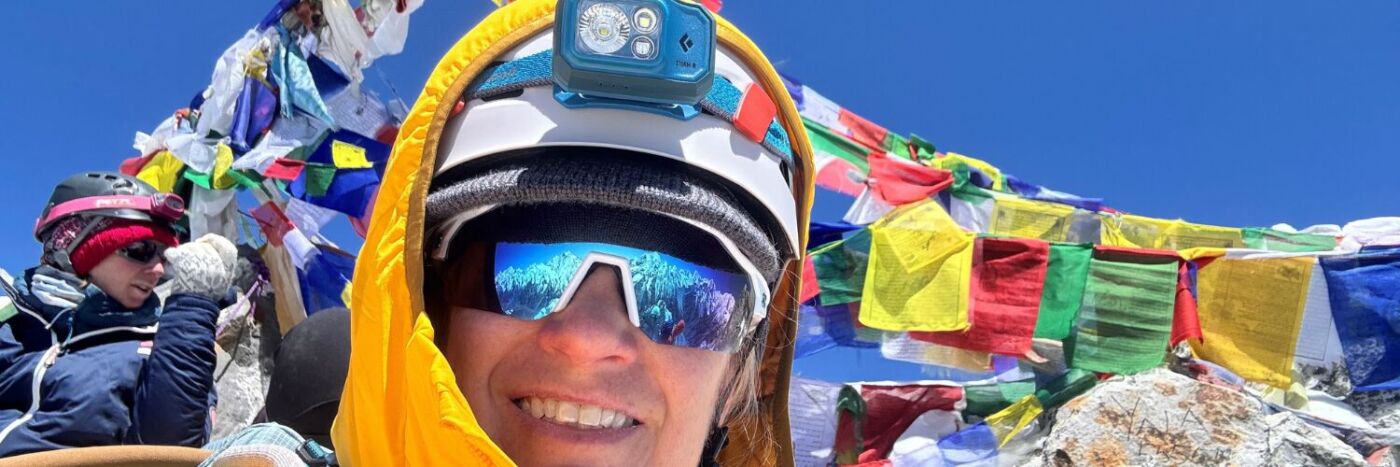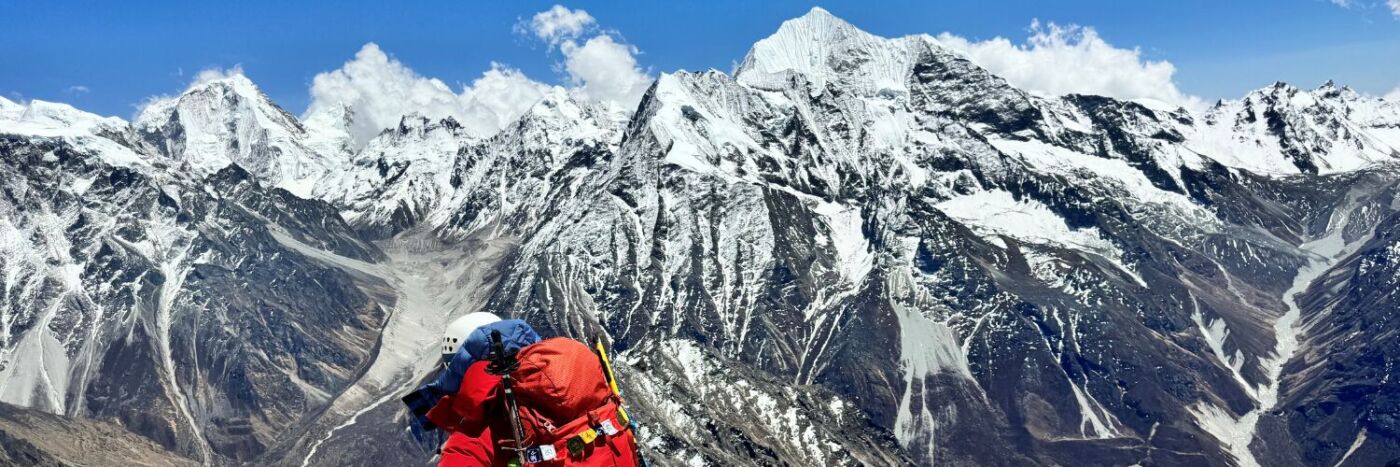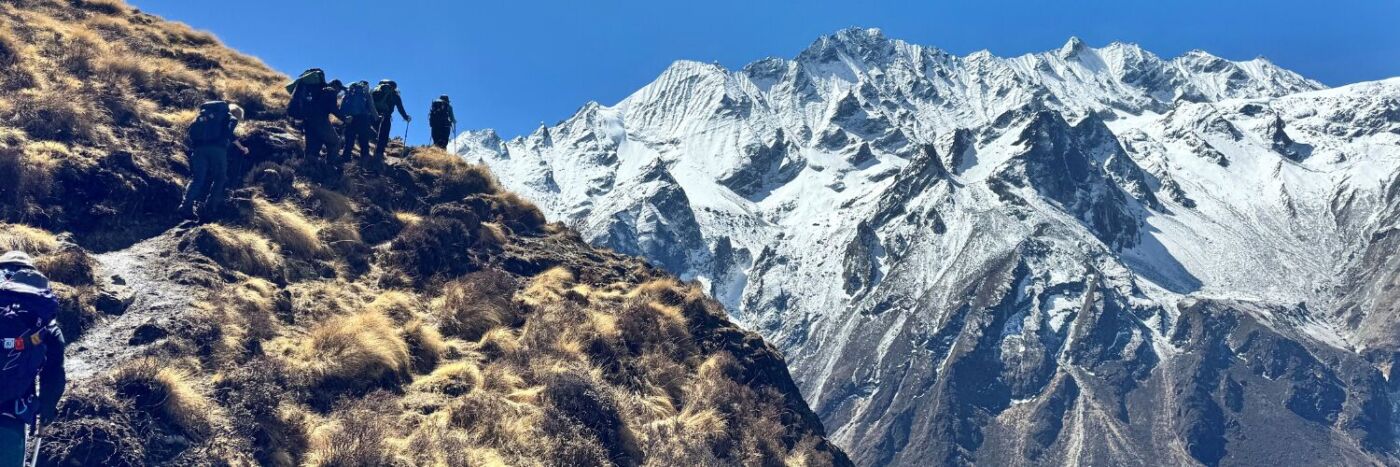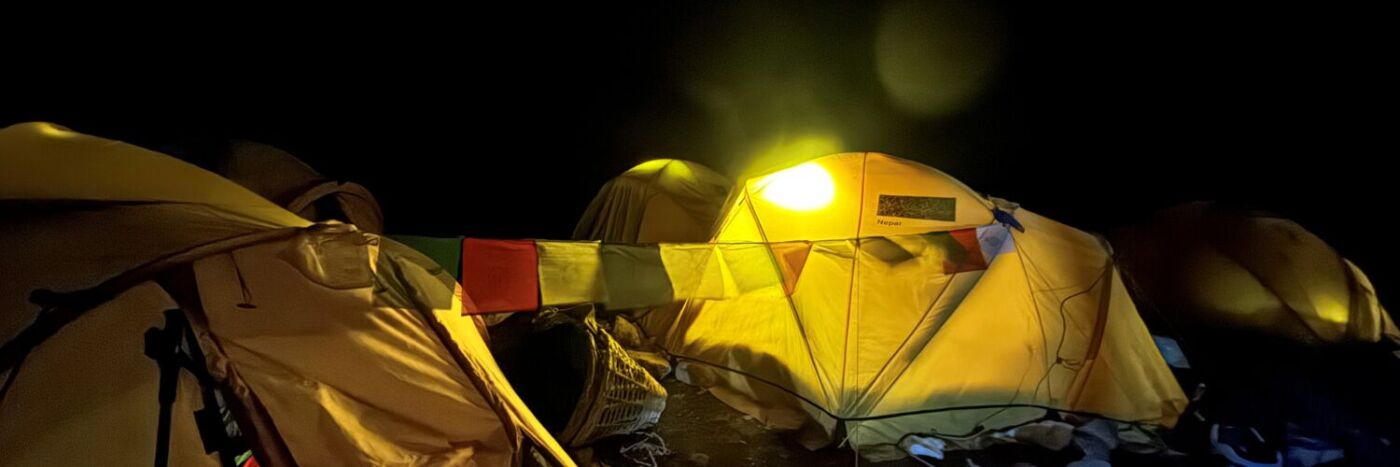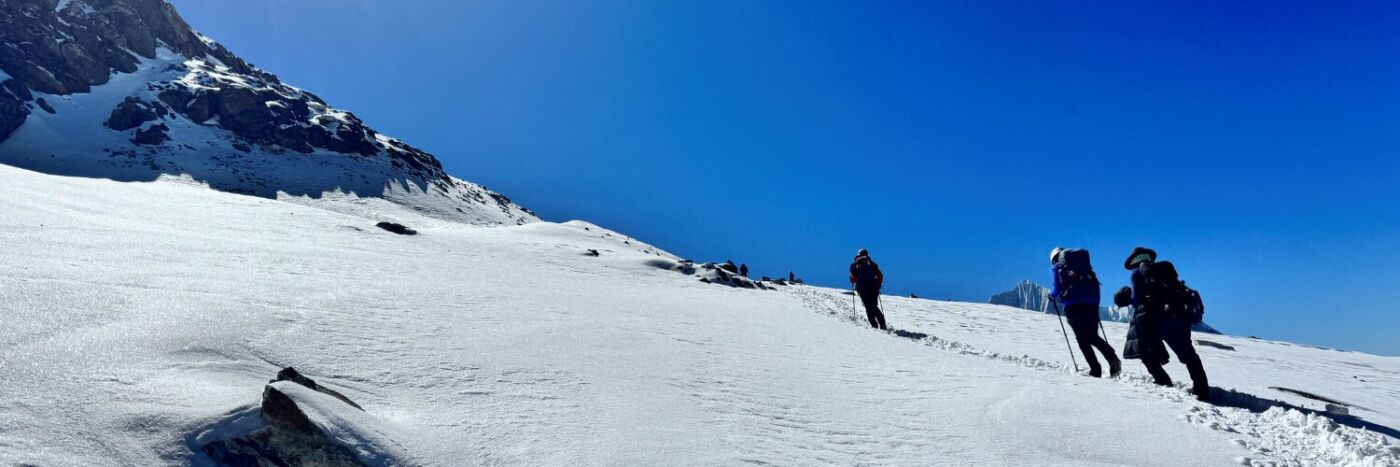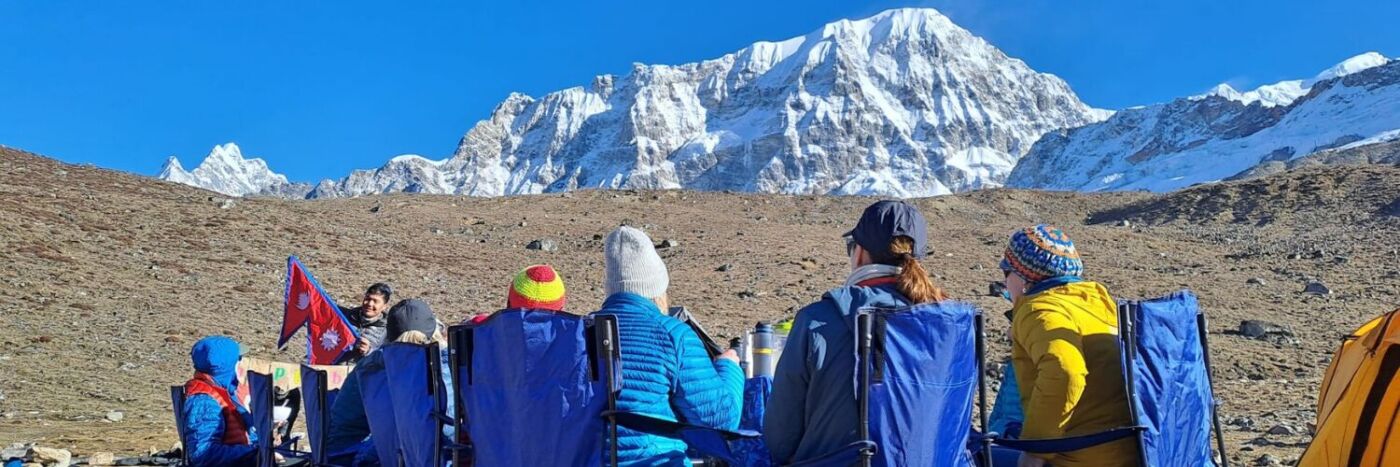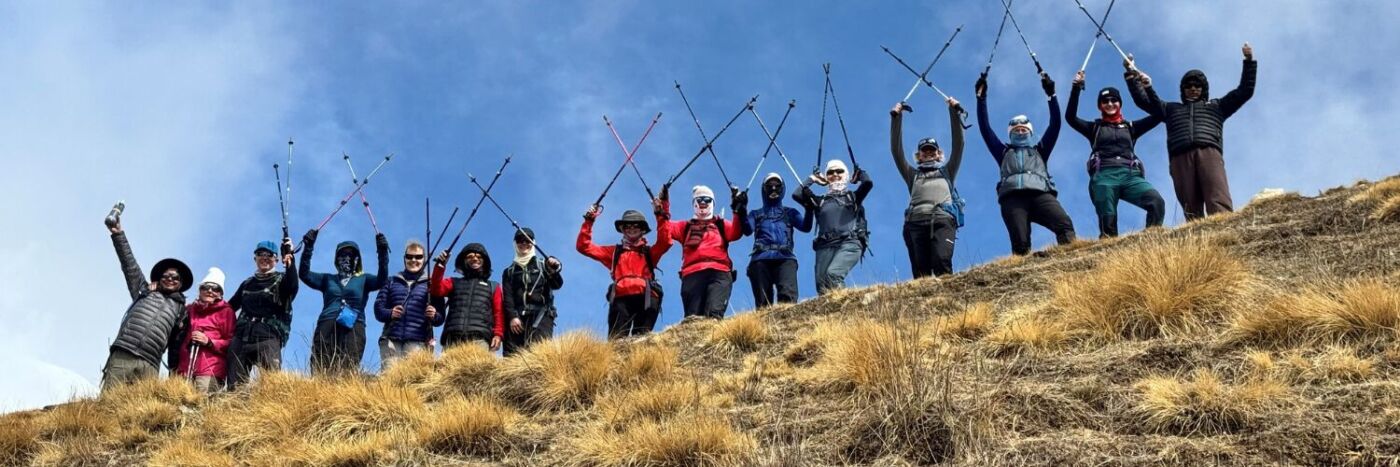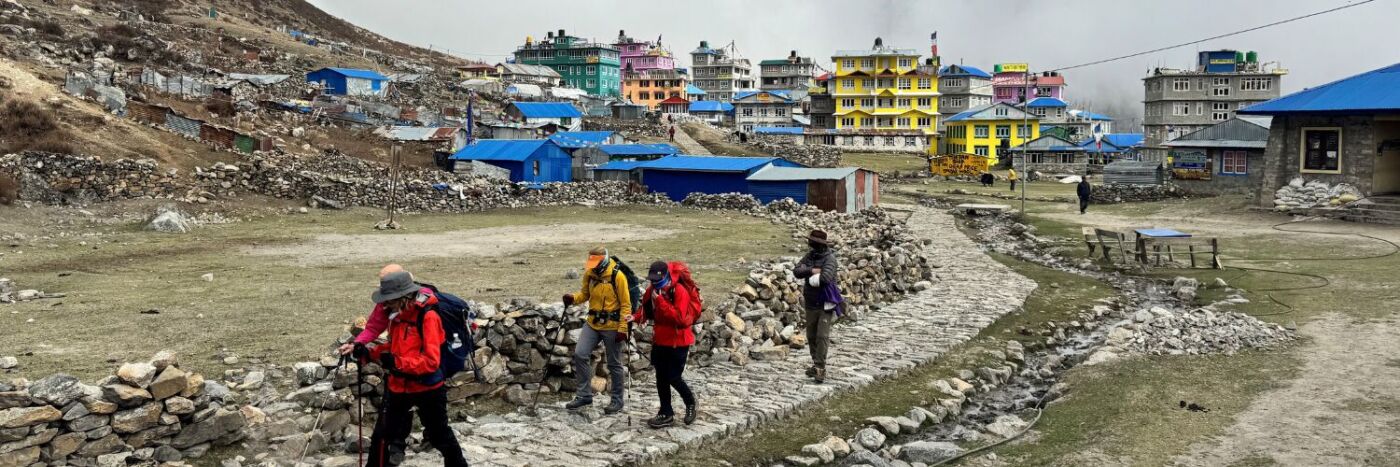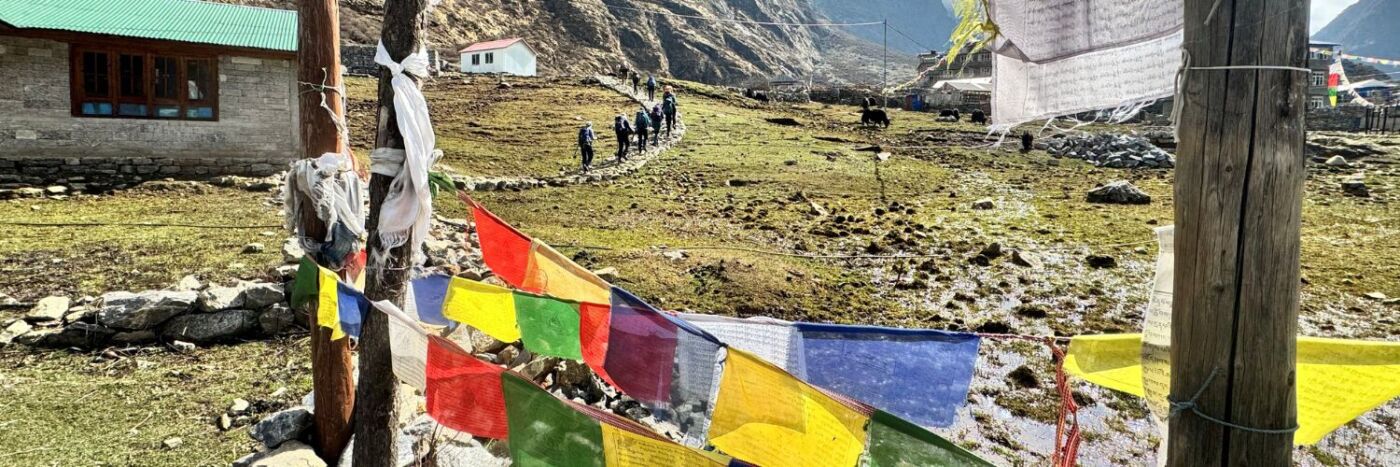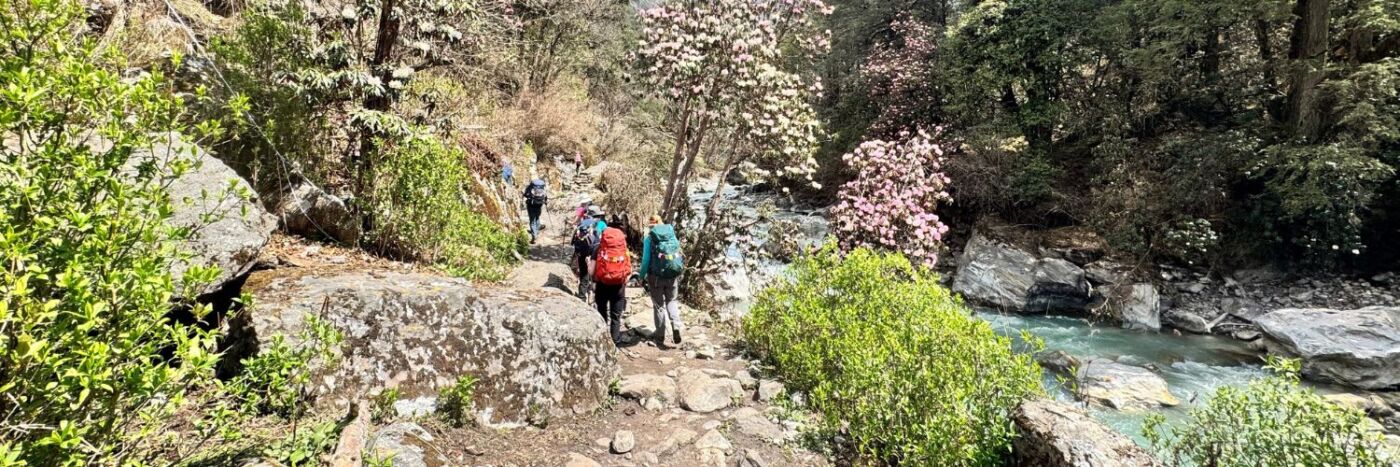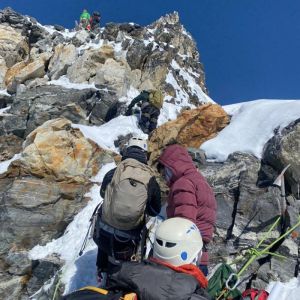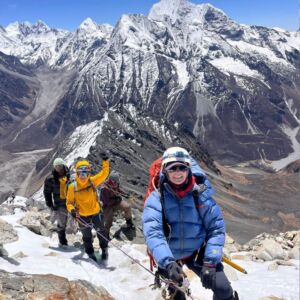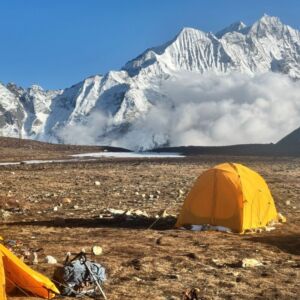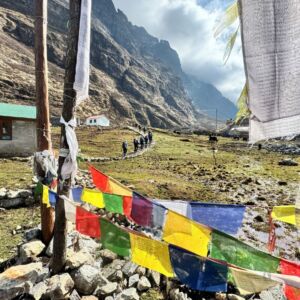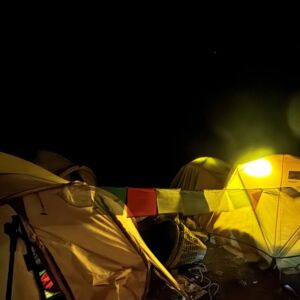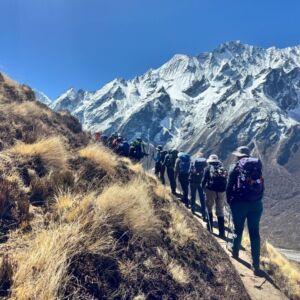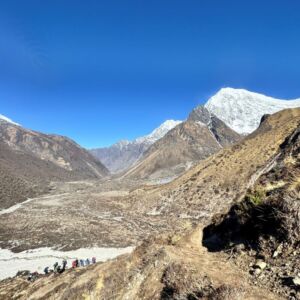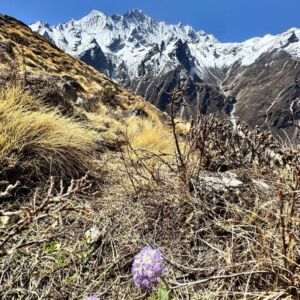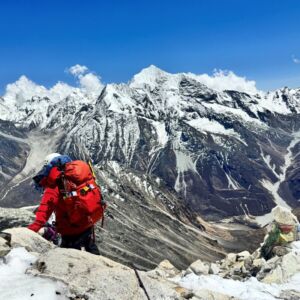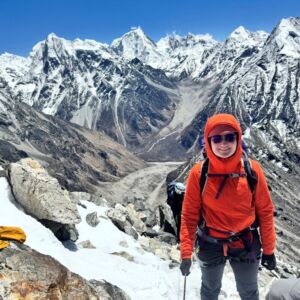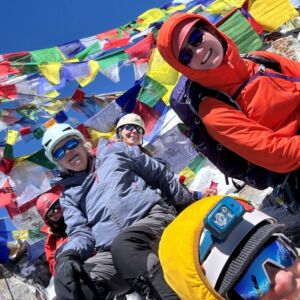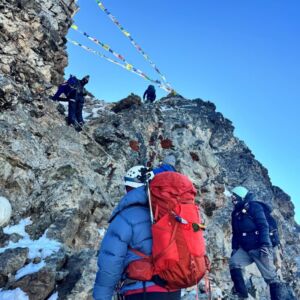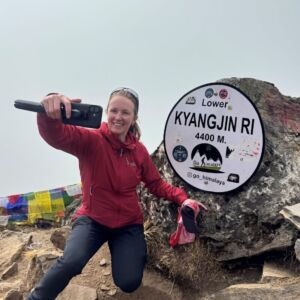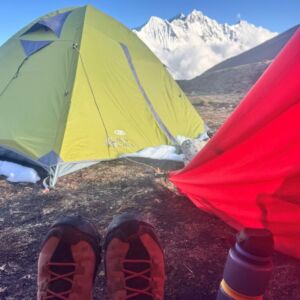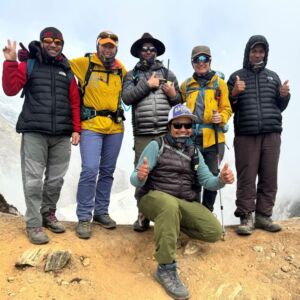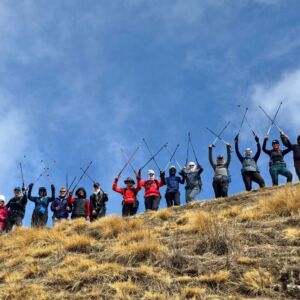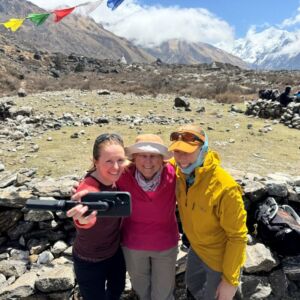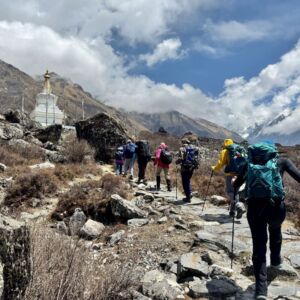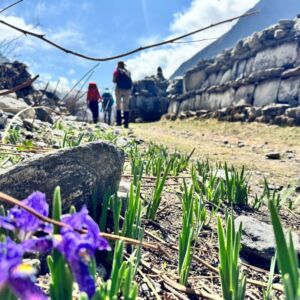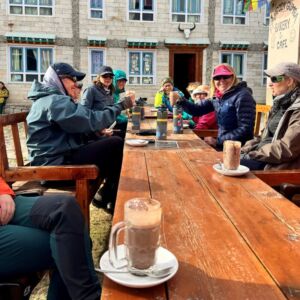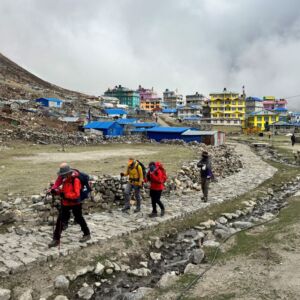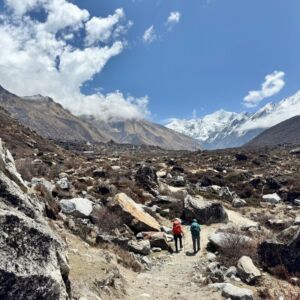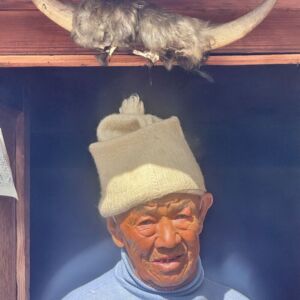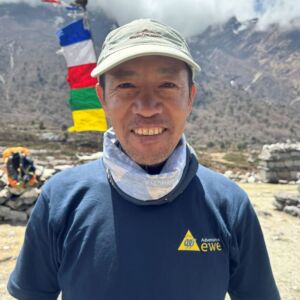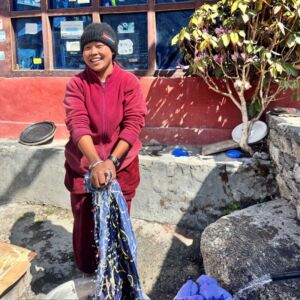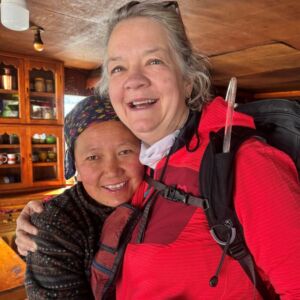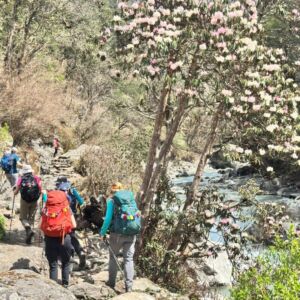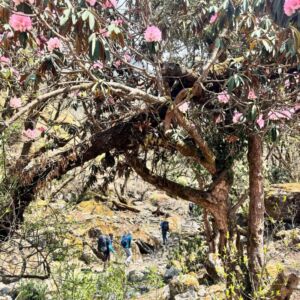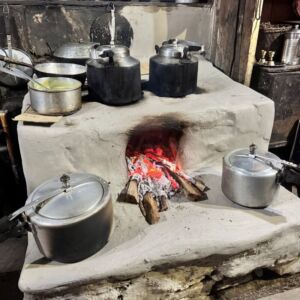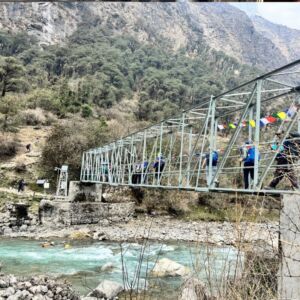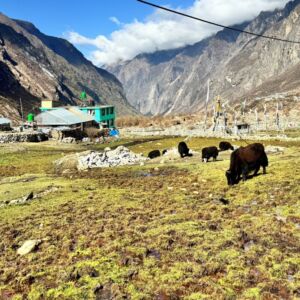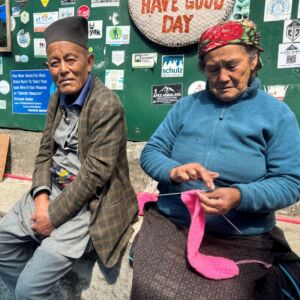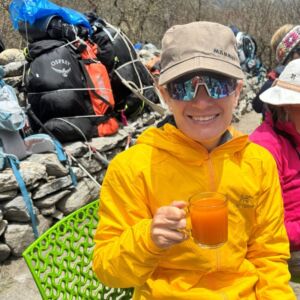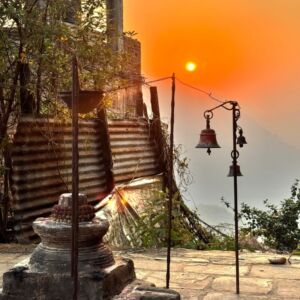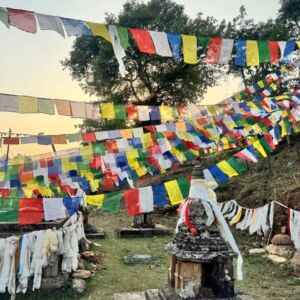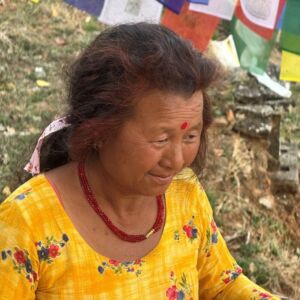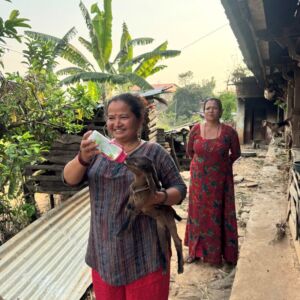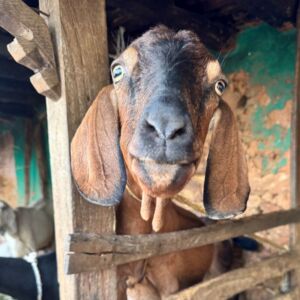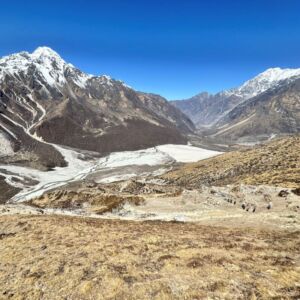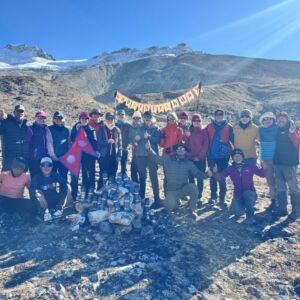- Overview
- Map & Itinerary
- Essential Info
- Pics & Vids
- Dates & Prices
Highlights
-
8 days trekking in the remote & beautiful Langtang region
-
Summit Yala Peak (5,550m) and learn basic mountaineering skills
- Led by Jo Bradshaw — 7-Summiteer including Everest
-
Escape the crowds in a quieter corner of Nepal
-
Trek from forest trails to high alpine terrain
-
Epic views of Shishapangma (8,027m) and Langtang Lirung (7,234m)
-
Experience the culture and landscapes near the Tibetan border
-
Free Water-To-Go bottle to minimise our plastic foot-print in Nepal.
Overview
Venture into one of Nepal’s most breathtaking and less-travelled regions on this Himalayan expedition. The Langtang Valley, often considered the most beautiful in the country, is home to colourful rhododendron-lined trails, forested ridges, high alpine trails, and soaring peaks that stretch towards the Tibetan border.
Following the course of the Langtang Khola river, your journey winds through traditional mountain villages and vibrant woodlands before opening out into a remote mountain valley surrounded by some of the highest peaks in the region. Along the way, you’ll spot wildlife, experience the warmth of local hospitality, and be humbled by the resilience and generosity of communities who call these mountains home.
The final leg of the trek takes you to a high-altitude base camp, encircled by 360-degree views of Himalayan giants including Shishapangma (8,027m) and Langtang Lirung (7,234m). Nearby, a serene high-altitude lake offers a moment of quiet reflection before summit day.
Yala Peak (5,550m) rises at the head of the valley, and reaching its summit is a proud moment – the culmination of days spent learning new skills, adapting to the high mountain environment, and immersing yourself in the rhythms of life in the Himalayas.
For those who crave wild trails, epic Himalayan panoramas, and the chance to build mountain skills while connecting deeply with the land and its people – this is your kind of adventure.
Welcome to Nepal! You’ll be met on arrival at a designated time and transferred to your hotel in the heart of Thamel – Kathmandu’s vibrant traveller district.
As you drive through the city’s lively streets, take in the sights, sounds and scents of this historic capital. Known for its hidden courtyards, ancient temples and buzzing markets, Kathmandu offers a captivating mix of tradition and transformation. Your hotel, the iconic Kathmandu Guest House, is the perfect base to unwind, meet your team, and begin your Himalayan journey.
Included meals: Dinner
Accommodation: Kathmandu Guest House – Deluxe Room
Roadtrip to Syabrubesi (1,460m)
Leaving the bustle of Kathmandu behind, today’s journey takes you deep into the heart of rural Nepal. You’ll travel north via a scenic alternative route through Shivapuri National Park, a peaceful and forested sanctuary that stands in contrast to the city’s energy.
As you climb toward Gurje Bhanjyang, the Langtang Himalayan range gradually comes into view – a breathtaking first glimpse of the mountains that await. From here, the road winds dramatically through hillside villages, terraced farmland, and forested slopes, offering a rich and colourful window into Nepalese countryside life.
After rejoining the main road, the landscape shifts again as you pass bustling market towns and follow the Trisuli River north. The road becomes rougher as you gain elevation, eventually reaching the village of Syabrubesi, your gateway to the Langtang Valley.
Driving duration: Approx. 6–7 hours
Included meals: Breakfast, Lunch, Dinner
Accommodation: Basic Lodge
Trek to Lama Hotel (2,470m)
Your journey on foot begins with a descent to cross a suspension bridge over the Bhote Kosi River. Climbing up through Old Syabru Village, you’ll pass traditional Tamang homes – an early insight into the region’s rich cultural heritage.
The trail then weaves through dense forest filled with birdlife, wildflowers, waterfalls and troops of monkeys. With luck, you might even catch a glimpse of the elusive red panda, known to inhabit this area.
A steep section leads to the Langtang Khola, where the trail levels into a gentler climb through a dramatic wooded gorge. After crossing to the north bank, the final stretch brings you past Langtang View Hotel and onwards to Lama Hotel – a peaceful lodge nestled beside the river, surrounded by forest and framed by glimpses of the peaks ahead.
Trek duration: Approx. 6 hours
Included meals: Breakfast, Lunch, Dinner
Accommodation: Basic Lodge
Trek to Langtang Village (3,430m)
Continuing along the Langtang Khola, the trail gently climbs through forest and scattered settlements before reaching Ghora Tabela (2,970m) – a former army post with breathtaking views of Langtang Lirung (7,234m) towering above.
From here, the path climbs steadily, zigzagging higher into the upper valley. The landscape opens at Thangshep, where the valley broadens and curves ahead, revealing a more expansive, high-altitude setting.
Passing through fields bordered by dry-stone walls, the trail leads to Langtang Village, a traditional Tibetan-style settlement that was rebuilt following the 2015 earthquake. This peaceful village offers a quiet insight into life in the high Himalayas.
Trek duration: Approx. 6 hours
Included meals: Breakfast, Lunch, Dinner
Accommodation: Basic Lodge run by a lady who lost her husband in the 2015 devasting landslide
Trek to Kyanjin Gompa (3,850m) & Optional Acclimatisation Hike to Kyanjin Ri (4,773m)
Today’s walk takes you deeper into the heart of the Langtang Himal. Leaving Langtang Village, the trail follows yak pastures and meandering streams before climbing gradually along an ancient moraine. Mani walls line the path, and Gengchempo (6,387m) rises dramatically to the east.
After a short descent and crossing a streambed, the trail climbs again past Mundu and Sindum, two traditional Tamang hamlets. Gaining height gradually, you’ll cross a wooden bridge before the final ascent to Kyanjin Gompa, a picturesque village surrounded by the towering Langtang range and Langshisa peaks.
In the afternoon, there’s the option to hike up Kyanjin Ri (4,773m) – a steep but rewarding acclimatisation hike offering spectacular 360° views across the Langtang Himal. It’s a true highlight.
Trek duration: Approx. 3 hours (excluding Kyanjin Ri)
Kyanjin Ri hike: Approx. 2 hours up, 1 hour down (optional)
Included meals: Breakfast, Lunch, Dinner
Accommodation: Basic Lodge
Acclimatisation Day – Hike to Tserko Ri (4,984m)
Today is an important acclimatisation day based at Kyanjin Gompa, with the option to summit Tserko Ri (4,984m) – a challenging hike that offers even more expansive views than Kyanjin Ri.
There are two route options: a steep, more direct ascent via the west spur through Tarchepisa, or a longer but more gradual trail skirting the southern slope, passing yak herders at Digyabasa before crossing a stream and climbing steadily towards Yala Peak Base Camp. From there, it’s a further 2 to 2.5-hour push to reach the summit of Tserko Ri, where snow often lingers near the top.
The effort is well worth it – the 360° panorama from the summit is simply breathtaking, with peaks and glaciers stretching to the horizon.
Trek duration: Approx. 8–9 hours
Included meals: Breakfast, Lunch, Dinner
Accommodation: Basic Lodge
Trek to Yala Peak Base Camp (approx 4,400m)
Today you leave Kyanjin Gompa behind and head deeper into the high mountains. The trail begins with a gentle climb alongside the Chubichu Khola, before crossing the stream and tackling a steeper ascent toward Dharche Tsea.
From here, the trail continues to rise steadily, reaching Dikapsa after another 1.5 hours of climbing. A final push leads you to Base Camp, perched at 4,400m and surrounded by dramatic views of Ganchenpo, Naya Kanga, and Tserko Ri.
Later in the afternoon, you’ll take time to go through essential mountaineering skills, practising with crampons, fixed ropes, ascenders & descenders, harnesses and ice axes to prepare for the summit ahead.
Trek duration: Approx. 6 hours
Included meals: Breakfast, Lunch, Dinner
Accommodation: Tented Camp
Summit Yala Peak (5,550m) & Return to Kyanjin Gompa
Today is the high point of the expedition – both literally and emotionally – as you set out to summit Yala Peak (5,550m). An early alpine start sees you climb steadily from Base Camp to High Camp (just over an hour), where the route steepens and becomes more technical.
The ascent includes a mix of snow and rocky ground, with sections requiring ice axes, crampons, roped glacier travel and fixed ropes. Expect around 5 hours of climbing from High Camp to the summit – a true Himalayan mountaineering experience.
At the top, you’re rewarded with panoramic views across the Langtang range and into Tibet, including the mighty Shishapangma (8,027m). After taking in the moment, you’ll descend cautiously back to Base Camp and, time and energy permitting, continue down to Kyanjin Gompa.
Trek duration: Approx. 12+ hours (5 hours up, 5–7 hours down)
Included meals: Breakfast, Lunch, Dinner
Accommodation: Basic Lodge
Contingency Day – Weather or Acclimatisation Buffer
This day is built into the itinerary as a flexible buffer to allow for weather delays or additional acclimatisation, ensuring the best chance of a safe and successful summit. If unused, it can be enjoyed as a rest day or extra time to explore the area.
Included meals: Breakfast, Lunch, Dinner
Accommodation: Basic Lodge or Tented Camp
Trek Back to Lama Hotel (2,470m)
Today you’ll retrace your route down the Langtang Valley, offering a fresh perspective on the landscapes you passed on the way up. The descent follows a mix of gradual paths and steeper sections through alpine meadows and forested trails.
There’ll be a well-earned break en route before arriving back at Lama Hotel for a comfortable overnight stay. Please note, the itinerary may shift depending on conditions following summit day.
Trek duration: Approx. 5 hours
Included meals: Breakfast, Lunch, Dinner
Accommodation: Basic Lodge
Trek to Syabrubesi & Drive to Nuwakot
Your final day on the trail begins with a 6-hour descent to Syabrubesi, following the familiar forested path down through the lower reaches of the Langtang Valley. After a celebratory lunch, you’ll hop into private jeeps for the 4-hour drive south through Trisuli Bazaar to the historic hilltop town of Nuwakot.
Overlooking the upper Trisuli River, Nuwakot is a peaceful gem steeped in history, with its 18th-century palace, ancient temples, and charming village streets. You’ll stay at The Famous Farm, a beautifully restored farmhouse that blends traditional Nepali rural life with modern comforts.
This serene setting is the perfect place to relax after your mountain journey – enjoy riverside views, explore the village on foot, and savour fresh organic meals made from locally grown produce.
Trek duration: Approx. 6 hours
Drive duration: Approx. 4 hours
Included meals: Breakfast, Lunch, Dinner
Accommodation: The Famous Farm, Nuwakot – a well deserved post-trek treat
Return to Kathmandu & Celebration Dinner
Enjoy a relaxed start to the day before departing Nuwakot for the scenic 2.5-hour drive back to Kathmandu, retracing the quieter backroad you travelled earlier in the expedition.
Back in the capital, there’s time to unwind or explore Thamel’s shops and cafés before gathering in the evening for a celebratory group dinner – a chance to reflect on the journey, share stories, and toast to your achievements in the Himalayas.
Drive duration: Approx. 2.5 hours
Included meals: Breakfast, Lunch, Dinner
Accommodation: Kathmandu Guest House – Deluxe Room
Explore the Cultural Heart of Kathmandu
Today is all about diving into the rich history, spirituality, and vibrant traditions of Kathmandu with our knowledgeable local guide. From sacred sites to hidden alleys, this immersive cultural tour offers a deeper connection to Nepal’s capital city.
-
Pashupatinath: Visit one of Hinduism’s most sacred temples and witness the ancient rituals of life, death, and rebirth along the Bagmati River.
-
Boudhanath Stupa: Join pilgrims as they spin prayer wheels beneath this towering dome, soaking in the peaceful energy of one of the largest Buddhist stupas in the world.
-
Swayambhunath (Monkey Temple): Climb to this iconic hilltop stupa for panoramic views of the Kathmandu Valley and encounters with curious monkeys along the way.
-
Kathmandu Durbar Square: Step back in time among palaces, pagodas, and statues – and learn the story of the Living Goddess (Kumari) and the city’s colourful past.
The day ends with a scenic walk through Kathmandu’s spice-scented backstreets, offering one final window into daily life before your journey comes to a close.
Included meals: Breakfast, Lunch, Dinner
Accommodation: Kathmandu Guest House – Deluxe Room
Return Home or Extend Your Stay
It’s time to say farewell to Nepal – or begin your next chapter if you’re extending your stay. As your flight lifts off, take a moment to reflect on all you’ve achieved: pushing your limits, learning new skills, and embracing the raw beauty of the Himalayas.
Beyond the summit, you’ll return home with lifelong memories, friendships, and the shared spirit of an extraordinary adventure.
Included meals: Breakfast
Nepal has experienced more than it’s fair share of impacts over the past few years with devasting earthquakes, avalanches and COVID-19. We’re passionate about supporting the tourism industry to Nepal to help with it’s recovery, not just to the more frequented regions of Everest and Annapurna, but also to the less visited areas which include Langtang. The tourism industry contributed about 6.7% to Nepal’s GDP, while its total impact was US$ 2.2 billion. In addition, in 2019, tourism supported over one million direct and indirect jobs, or 6.7% of total employment. Approximately 80% of these jobs are in the most remote and resource-constrained regions.
In 2026, we return to the Langtang region to mark 11 years since the devastating earthquake that shook Nepal in 2015. This journey is a chance to not only challenge yourself at altitude but to honour the lives and communities forever changed by that moment. You’ll spend a night in the heart of Langtang Valley in a lodge run by an incredible woman who lost her husband in the earthquake. Her warmth, strength and hospitality leave a lasting impression on all who visit. It’s a meaningful opportunity to support her and the local economy, and to witness the spirit of rebuilding first-hand. You’ll also spend a night in Nuwakot at The Famous Farm, a beautifully restored heritage site that plays a key role in supporting the local village’s recovery and regeneration. By staying here, you help continue the story of restoration – brick by brick, night by night.
This expedition offers more than just mountain views and summit moments. It’s a powerful reminder of the human stories woven through every step of the trail. Come for the climb. Stay for the connection.
We develop and host sustainable adventures to help support local communities and give you the chance to have a more meaningful travel experience. This exclusive expedition has been created in line with our Travelife Partner award in sustainable tourism.
When you book your Yala Peak Expedition, you’ll get instant access to all your trip details through our free mobile travel app.
From your full itinerary and trip countdown to live updates, kit lists, local weather forecasts, and essential pre-departure info – it’s all right there in your pocket, 24/7. No bulky paperwork, no endless printouts—just everything you need, all in one place. It’s better for the planet, and much handier for you. A’ppy days indeed.
As a small family-run business, we pride ourselves on offering a personal, professional, and genuinely friendly service. We understand that everyone joins the Yala Peak Expedition with their own story, experience level, and goals – so we’re here to support you with whatever you need, every step of the way.
From the moment you join the flock to the moment you return home, you’ll be supported by a team who’ve been there themselves – quite literally. Sue has personally summited Yala Peak and is always happy to chat through any questions, no matter how big or small. Whether it’s kit advice, altitude queries, or just reassurance, you’ll be able to speak directly with someone who truly gets it.
With decades of adventure experience between them, Jim and Sue have travelled and explored extensively across Nepal and beyond. Their insight and passion fuel every aspect of our expeditions – so you can feel confident, well-prepared, and inspired ahead of your Himalayan journey.
Flights are not included in your travel package, giving you the freedom to choose the best option for you—whether that’s flying from your nearest airport, using frequent flyer points, or extending your adventure in Nepal.
Once you book your Yala Peak Expedition, we’ll send you the recommended group flight details. These timings include airport transfers in Kathmandu, so if you’re arriving on the group flight, everything’s taken care of. If you choose to arrive outside these times, it’s easy to take a taxi to the hotel, or we can arrange a private transfer at an additional cost.
You’re welcome to book flights directly with the airline or through our trusted flight agent, who is ATOL and ABTA protected. We work on a no-mark-up, no-commission basis—so you’ll only ever pay the direct cost of the flight.
And of course, if you have any questions or would like support with booking, just drop us a line at info@adventurousewe.co.uk – we’re here to help.
Road travel in Nepal can be a bumpy ride – both literally and figuratively – so it’s worth setting expectations ahead of time. While driving standards may differ from those at home, we go the extra mile to ensure your safety and comfort by using reliable, well-maintained vehicles and experienced drivers for all our transfers.
Please note that in Nepal, it’s not a legal requirement for rear seatbelts to be fitted in vehicles. While we do our best to use vehicles with rear seatbelts wherever possible, this cannot always be guaranteed. If you have any concerns about the vehicle or the standard of driving, please don’t hesitate to speak with your Leader straight away – we’re here to help.
Road conditions can vary significantly, especially due to ongoing infrastructure projects. Currently, major roadworks are taking place in and around Kathmandu, and delays, traffic congestion, dust, and uneven road surfaces are part of everyday travel. Demonstrations and strikes (bandhs) can also occasionally disrupt travel without warning. Patience and flexibility are key – and your Leader will always keep you updated and supported en route.
To enter Nepal, you’ll need a valid passport and visa. Please ensure your passport meets the following requirements:
-
Passport Validity: Your passport must be valid for at least 6 months from your date of arrival in Nepal.
-
Blank Pages: It must have at least one blank page for your visa stamp.
Important Notes:
-
Carry a printed copy of your visa confirmation if you apply online.
-
Always check the latest guidance before travel as requirements may change.
For up-to-date official advice, visit:
-
UK travellers: gov.uk Nepal Entry Requirements
-
Australian travellers: Smartraveller Nepal
All foreign nationals, except Indians, are required to have a valid visa to enter Nepal. A valid Nepalese visa, which can be obtained from Nepalese diplomatic missions outside Nepal or on arrival in-country, is also required to enter Nepal. Information regarding Nepalese visa and immigration can be found on the Government of Nepal’s website, www.nepalimmigration.gov.np. Please note, requirements often change and it is your responsibility to obtain any required visas for this trip. Therefore, we recommend that you check with the nearest embassy or consulate of your chosen destination(s), including any countries you may be transiting or transferring through.
Some local governments provide guidance on what visas their citizens need. To help, we’ve gathered a selection of useful links below.
- Australia: www.smartraveller.gov.au/destinations/asia/nepal
- Canada: www.travel.gc.ca/destinations/nepal
- United Kingdom: www.gov.uk/foreign-travel-advice/nepal/entry-requirements
- USA: www.travel.state.gov/content/travel/en/international-travel/International-Travel-Country-Information-Pages/Nepal.html
You can obtain your visa in advance or on entry. If possible, apply in advance as queues on arrival can be very long. Please note, the Immigration Department of Nepal has suspended visas on arrival for certain nationalities – please check if this applies to you with your nearest embassy or consulate .
When you arrive at Tribhuvan International Airport in Kathmandu, there will be three lines. If you have already secured you visa, go straight to the Immigration line. If not:
- Fill in a tourist visa form at the electronic kiosks. After inserting your passport, the machine will automatically fill out an application form, take an electronic photograph of you and print a paper slip. If the machine won’t read your passport, complete the details manually using the touchscreen. We recommend taking a passport photo with you just in case.
- Proceed to the visa fees collection counter and pay the visa fee (in cash, if possible). Make sure to keep the receipt.
- Go to the relevant immigration desk and present your tourist visa form, payment receipt and passport to obtain your 15-, 30- or 90-day visa stamp. Please check you have been given the correct visa duration.
Travel Insurance & Global Rescue
Travel insurance is a vital part of your Yala Peak Expedition – and it’s compulsory for all participants. Your policy must include comprehensive cover for:
-
The full value of your trip
-
Medical expenses (including emergency evacuation and repatriation)
-
All activities undertaken on the expedition, trekking to 5550m
-
Personal liability
-
Trip cancellation and curtailment
-
Loss of luggage and personal belongings and flight delays
-
Pandemic-related travel disruptions
For UK residents, we’ve partnered with Campbell Irvine Direct, a specialist insurance broker, to offer tailored travel insurance. If you’d like a quote for cover that aligns with our expedition requirements, visit here.
Important:
We suggest getting Travel Insurance cover once you have booked your trip.
Global Rescue Membership
For added peace of mind while trekking in remote mountain regions, we recommend short-term membership with Global Rescue. They provide expert support in medical, security, and evacuation services – offering protection up to $500,000 USD.
Unlike traditional insurance, Global Rescue acts immediately from the point of illness or injury. They’ll coordinate your evacuation to the nearest suitable medical facility for stabilisation, and once you’re fit to travel, they’ll arrange onward repatriation to your home hospital—with no claims process required.
All services are covered through a single, upfront membership fee. It’s a reassuring option for remote, high-altitude adventures.
For more information and to sign up, click here.
Leaders & Crew
Your Yala Peak Expedition will be guided by a highly experienced and dedicated team, ensuring your journey is not only safe but deeply enriching and enjoyable.
UK High Altitude Mountain Leader
You’ll be accompanied by a qualified UK High Altitude Mountain Leader with extensive experience leading expeditions in Nepal and operating at altitude. Their role is to support your acclimatisation, safety, and overall experience, while working closely with the local team to deliver a smooth and memorable adventure.
For 2026 our Yala Peak Expedition will be led by Everest Summiteer, Jo Bradshaw.
Local Guides
Our Local Guides are the heartbeat of the expedition – bringing with them not only deep knowledge of the terrain but also the renowned warmth and hospitality of the Sherpa people. For them, mountain guiding isn’t just a job – it’s a lifelong passion.
You’ll feel their commitment in every step, whether it’s sharing local stories, adapting the pace to support you, or ensuring your safety and comfort throughout. They’re trained in altitude awareness and emergency procedures, and remain in constant communication with our Kathmandu office and Adventurous Ewe HQ via Garmin InReach, radio, and mobile.
Climbing Guides
On summit day, you’ll be joined by additional local climbing guides who will support the team using fixed ropes to safely manage both the ascent and descent. Training in rope use and technique will be provided before summit day to help build your confidence and prepare you for the climb.
Porter Welfare
We firmly believe that the well-being of our porters and mountain crew is essential. They are the soul of every expedition, and we treat them as valued team members, not just staff.
All our porters are:
-
Fairly paid
-
Properly insured
-
Provided with suitable clothing, meals, and accommodation
We work in line with international porter welfare standards and ensure everyone trekking with us – from porters to guides to participants – is looked after with respect and dignity. In the mountains, we’re all in it together.
Group Size & Private Departures
We proudly specialise in small group travel – not just for a more personal experience, but to minimise our environmental impact, enhance safety and wellbeing, and ensure a more authentic connection with the places and people you encounter.
The Yala Peak Expedition requires a minimum of 6 people to run, with 8 also being the maximum group size. This allows for a close-knit, supportive team environment on the trail.
You’re very welcome to join this trip as a solo traveller, with friends, family, or colleagues – and many of our participants choose to do so as a charity fundraiser for a cause close to their heart.
If you have a group of 6 – 8 people, we’d be delighted to organise a private departure tailored specifically for your team, charity, or organisation.
For more details or to chat about creating a bespoke Yala Peak Expedition, drop us a line at info@adventurousewe.co.uk – we’d love to help make it happen.
The Yala Peak Expedition is graded as ‘Extreme’ due to the combination of multi-day trekking at high altitude, challenging terrain, and summit day rope work. This is a physically demanding adventure that requires a good level of fitness, previous trekking experience, and a readiness to embrace the realities of high-altitude expedition life.
You’ll be hiking long distances on consecutive days, crossing high mountain passes, and eventually summiting Yala Peak at 5,550m. The final ascent involves the use of fixed ropes, with mountain skills training provided ahead of summit day. While the trek follows established trails, you’ll also cross multiple suspension bridges – secure and fitted with mesh sides, but potentially daunting for those with a fear of heights. Our experienced guides will offer full support to help you across.
Altitude & Conditions
As you gain height, altitude-related symptoms such as shortness of breath, reduced appetite, disrupted sleep, and general fatigue are common. We’ve built in a considered acclimatisation programme to support you, but mental resilience and a team-focused mindset are just as important as physical stamina.
Be prepared for:
-
Basic accommodation in mountain lodges
-
Limited washing and toilet facilities
-
Cold temperatures, especially at night and higher altitudes
-
Rough terrain and long trekking days with a 35-litre daypack
This is not a luxury trip – it’s a real mountain experience. But with strong teamwork, guidance from expert leaders, and the right preparation, it is also an incredibly rewarding and transformative journey.
Who is this for?
This expedition is suitable for those who:
-
Have previous trekking experience, ideally in uneven or mountainous terrain
-
Are comfortable carrying a daypack for extended periods
-
Have a good level of general fitness and endurance
-
Are willing to embrace discomfort, stay flexible, and support their teammates
If you’re up for a true mountain challenge, the Yala Peak Expedition offers one of the most powerful and meaningful adventures in the Himalayas. And we’ll be with you every step of the way.
Altitude Awareness & Acclimatisation
When trekking above 2,500 metres, your body must adjust to lower oxygen levels—a process known as acclimatisation. To support this, our Yala Peak itinerary has been carefully structured to allow a gradual ascent, helping your body adapt and reduce the risk of Acute Mountain Sickness (AMS).
What to Expect at Altitude
As part of the acclimatisation process, you may experience symptoms such as:
-
Headaches
-
Tiredness or fatigue
-
Disturbed sleep
-
Shortness of breath
-
Loss of appetite
-
Nausea
-
Swelling of the hands and face
-
A racing heartbeat or palpitations
Everyone adjusts at their own pace. Most people experience some discomfort, such as headaches or sleep disruption, but in rare cases a person may require closer monitoring and care. Our experienced Leaders and Local Crew are trained in high altitude awareness and will be on hand at all times to support you.
Pre-Trek Briefing & On-Trail Support
Before setting off, we’ll provide a detailed altitude briefing, covering:
-
What AMS is and how to recognise symptoms
-
How to best manage and reduce risk
-
What to do if you or a teammate feel unwell
The most important rule: don’t ignore the signs. AMS isn’t something to fear – but it must be respected. If you feel unwell, always tell your Leader immediately. You’re in experienced and capable hands.
Our Altitude Safety Guidelines
To help your body acclimatise effectively, we recommend the following:
-
Drink 3–5 litres of water per day
-
Avoid alcohol, and limit caffeine
-
Walk slowly, even around lodges
-
Keep warm, especially at night
-
Eat regularly, even if your appetite dips
Our trips follow our High Altitude Policy as part of our Safety Management System, and our team is trained to make informed decisions in your best interest.
If you have a pre-existing medical condition (e.g. heart or lung issues) or are taking any medications that may impact your ability to acclimatise, please consult your doctor before booking.
Safety First
While we’ll do everything we can to help you reach your goal, your safety will always come first. In some cases, your Leader may make the call to delay or halt your ascent if they believe it’s necessary for your wellbeing. Please respect this decision—it’s made with your health and safety at heart.
High altitude trekking is a powerful and transformative experience – and with the right preparation, awareness, and team support, you’ll be ready to take it on.
Training for Yala Peak
To help you get the most out of your expedition, we’ll provide you with a dedicated Trek Training Programme when you sign up. This guide will support your physical preparation and help you build the strength, stamina and resilience needed for trekking at altitude.
The more prepared you are, the more you’ll enjoy the challenge—both physically and mentally.
Top Training Tips:
Start Early – Begin training at least 3–6 months in advance. Build up gradually and stay consistent.
- Train on Hills & Uneven Terrain – Simulate the trek by walking on trails, hills and stairs while carrying a 35-litre daypack.
- Strengthen Your Legs & Core – Add strength training to your routine to help with long uphill stretches and balance on rough terrain.
- Add Stretching & Recovery – Incorporate yoga or flexibility work to improve recovery and reduce injury risk.
- Do Back-to-Back Days – Get your body used to trekking on consecutive days by training two days in a row.
- Listen to Your Body – Build endurance, not exhaustion. Rest days are just as important as training days.
- Walk Slow, Walk Long – Trekking isn’t about speed. Focus on long-distance walking at a steady pace.
- Hydrate & Fuel Properly – Practise drinking regularly and eating on the move—this will be essential at altitude.
And remember…
Train hard, smile harder, and enjoy the journey! 😊
Need help adapting the plan to your fitness level? Just let us know – we’re here to support you every step of the way.
Kit & Equipment
A full and detailed kit list will be provided upon registration for this expedition, helping you prepare for the conditions and challenges ahead. When it comes to high-altitude expeditions, having the right gear is key to your comfort, safety, and enjoyment.
Essential Trekking Kit
- Well-worn waterproof hiking boots – Your boots need to be supportive, waterproof, and broken in before the trek.
- Waterproof jacket and trousers – Mountain weather can change in moments; good waterproofs are essential.
- Warm layers, gloves, hat and buffs – Cold temperatures, especially at night and on summit day, require solid layering.
- 35-litre daypack – With room for daily essentials, snacks, and spare layers.
You’ll also receive exclusive Adventurous Ewe discount code for local specialist outdoor retailer Crib Goch Outdoor Shop – for quality mountain kit
Mountaineering Equipment
For summit day on Yala Peak (5,550m), you’ll need specific technical equipment. This can be purchased or hired through Adventurous Ewe. Required mountaineering kit includes:
- Climbing helmet
- Climbing harness
- 2 x locking carabiners
- Ascender
- Descender – figure of 8
- Crampons (compatible with your boots)
- Spikes/microspikes – for traction in icy conditions
All of this gear is essential for safely navigating the fixed rope sections on summit day. Training will be provided prior to the ascent to ensure you’re confident in using this equipment.
Support for Porters
If you have any unwanted kit you’d like to donate – such as warm layers, waterproofs, or trekking gear – your Leader will collect it at the end of the trek. These items will be fairly distributed amongst the local porters and crew, many of whom rely on donations to stay equipped for future work. A small gesture from you can go a long way for those who support us in the mountains.
Any questions about kit or hiring equipment? We’re here to help – please drop us a line.
Weather in Nepal
The prime trekking season in Nepal runs from October to mid-May, when conditions are generally favourable for hiking. During this period, daytime temperatures are comfortable across most altitudes, with clear skies and only occasional rain or snow. However, mountain weather is always unpredictable, so it’s essential to come fully prepared for a range of conditions.
Temperature Ranges:
Kathmandu Valley: 15ºC – 35ºC
Langtang Region (3,600m and above): Around 10ºC, dropping lower as you gain altitude
Yala Peak (Summit Day, 5,550m): Sub-zero temperatures, especially overnight and early morning
The Himalayas are wild and weather is always changeable, so be ready for anything – from blazing sunshine to sudden snowstorms or wind chill at altitude.
Your kit list and preparation will help ensure you’re well-equipped for a range of conditions, and your Leader will provide daily weather updates and advice while on the trail.
Any questions about what to expect? Just ask – we’re happy to help.
Accommodation
This expedition offers a variety of accommodation styles to reflect both the remote mountain environment and the cultural richness of Nepal. All accommodation is based on shared occupancy.
Kathmandu (2 nights)
We typically stay at the Kathmandu Guest House, located in the heart of the Thamel district. This charming hotel features en suite rooms, an on-site restaurant, a peaceful courtyard garden, and free Wi-Fi (available in the lobby and by login code in the rooms). It’s a comfortable and well-situated base for the start and end of your adventure.Tucked away in Kathmandu’s lively Thamel district, the Kathmandu Guest House has been a cherished haven for travellers since 1967. Once a grand Rana dynasty mansion, it has hosted an eclectic mix of guests – from mountaineers to artists – over the decades.
Teahouses (7 nights on trek)
Accommodation on the trek is in basic but adequate teahouses. Please be realistic about the standard – this is part of the adventure. Most teahouses provide:
-
Foam mattresses, sheets, and a pillow
-
Twin-share or dorm rooms
-
Unheated bedrooms – bring or hire a good quality sleeping bag
-
A central dining room (sometimes heated—fees may apply)
-
Simple toilets (mainly squat style, occasionally western)
-
Paid hot showers or buckets of hot water (Rs250–500)
-
Limited power for charging devices (Rs150–350 per hour)
Some of the teahouses we use are part of our local operator’s “Support Rural Nepal” project, which restores heritage buildings while generating employment for local artisans. In Bandipur (availability dependent), we aim to stay in one of these beautifully restored lodges that directly contribute to local livelihoods.
Important:
-
Wi-Fi is available in a few lodges, but it may be slow or unreliable.
-
Bring a head torch – lighting is often dim or inconsistent.
-
Most teahouses sell basic essentials (snacks, soap, tissues, toilet paper).
-
Dispose of toilet paper in the bins provided – never flush it.
Camping (1–2 nights)
During your summit attempt on Yala Peak, you’ll spend 1 – 2 nights at base camp in high-altitude conditions. All group camping equipment is provided, but you’ll need to bring (or hire) your own sleeping bag.
The Famous Farm, Nuwakot (1 night)
On your return journey, you’ll stay at The Famous Farm, a beautifully restored traditional Newari manor house nestled in the hills of Nuwakot. This special lodge directly supports the surrounding village through sustainable tourism and local employment. It’s a relaxing and wonderful way to round off your expedition.
Single Supplements & Extra Nights
If you’d like a private room, we offer a single supplement for the hotel nights in Kathmandu (subject to availability). Single rooms in teahouses cannot be guaranteed and are not included in the supplement price, but if available on the day, you can pay locally for a room to yourself.
If you’re planning to arrive early or extend your stay in Kathmandu, we’d be happy to arrange additional nights of accommodation – please let us know at the time of booking or email us at info@adventurousewe.co.uk.
Have any questions about what to expect? Just drop us a message – we’re here to help!
Food & Drink
Your expedition includes 13 breakfasts, 13 lunches, and 13 dinners, with meals served in local teahouses and lodges throughout the trek. Dining in the mountains is part of the experience – simple, hearty, and often shared with fellow trekkers around a warm stove after a day on the trail.
Meals on Trek
Breakfast:
Expect a choice of:
-
Bread (toast, chapatti, or Tibetan bread)
-
Eggs (boiled, fried, or omelette)
-
Muesli or porridge
- Pancakes with jam/honey (on some days)
-
Tea or coffee
Please note:
Some remote teahouses have limited menus due to weather conditions, delivery schedules – so flexibility is key.
Lunch & Dinner:
Lunch is usually taken en route at a local teahouse, while dinner is served at the teahouse where you stay overnight. Menu options may include:
-
Dhal bhat (Nepal’s national dish of rice, lentils, and vegetables or meat)
-
Momos (steamed or fried dumplings)
-
Fried rice or noodles
-
Pasta and soups
Special Diets & Allergies
If you have a gluten-free diet, food choices will be limited. We recommend bringing your own snacks and supplements. Gluten is present in many soups and sauces.
For gluten-free trekkers, expect:
-
Vegetable fried rice and eggs
-
Trekker’s breakfast (no toast, extra egg) on certain days
Vegan or lactose-intolerant trekkers can expect:
-
Muesli or porridge with water
-
Vegetable fried rice
-
Trekker’s breakfast (no egg)
Your Leader will do their best to help, but options are basic in remote areas.
Snacks & Extras
If you’d like extra snacks, you can:
-
Bring your own from home (remove packaging beforehand to reduce waste)
-
Buy local snacks in Kathmandu or on trek to support the community
Please note that imported snacks and drinks on the trail are expensive.
Water
Drinking water is not included as part of your trip cost, and it’s important to come prepared to stay well-hydrated – especially at altitude, where you’ll need to drink at least 3 – 5 litres per day to stay healthy and aid acclimatisation.
We strongly encourage you not to buy bottled water on the trek, as this contributes to plastic waste in remote mountain areas.
Water Options & Filtration
- Boiled water is available to purchase at most teahouses (approx. Rs150–300 per litre, increasing with altitude).
- Water-to-Go Bottle – As part of your trip, you’ll receive a free Water-to-Go bottle, which contains a high-performance filter removing 99.99% of microbiological contaminants from any non-salt water source. Use this for refilling on the go from taps, streams, or lodge supplies. Please note: you cannot add flavourings or powders to this bottle as it may damage the filter.
- Water purification tablets – We recommend bringing tablets to treat water collected in your hydration bladder or other bottles if you wish to use flavourings or electrolytes. This is a handy alternative when you don’t want to use your Water-to-Go bottle.
Important Tip:
If your Water-to-Go filter freezes, let it defrost by placing it in lukewarm water for 10–15 minutes before use.
Using refillable bottles and filtration is not only safer for you – it helps protect the fragile mountain environment too. By reducing single-use plastic, you’re contributing to a more responsible way of trekking in Nepal.
Deposit: £245 per person on booking.
Balance: £2430 per person is due no later than 4 weeks prior to the trip start date.
Total cost: £2675 per person
Monthly payment plan
A monthly payment plan can be arranged for this trip. Please contact us for more information or to set up your plan. Simply email info@adventurousewe.co.uk or call 01492 588 069.
Book & Travel with Confidence
As well as carefully crafting amazing and meaningful adventures across the planet, we’ve made booking them as flexible, safe and as simple as possible.
For the latest info regarding booking and travelling with Adventurous Ewe, please visit our website.
Fundraising
You’re welcome to fundraise for a charity of your choice if you wish to do so. All sponsorship monies are to be sent directly to your chosen charity.
Your Adventurous Ewe Leader/s and Crew will have a satellite phone, mobile phones and radios communications in case of emergencies. The team are trained to deal with these situations. Please ensure you listen to your Leader during these times and refrain from putting any posts on social media. Should you find yourself unable to continue with the trek, your Leader and crew will make the necessary arrangements. Depending on the situation, you will be met by the support vehicle (depending on access) and you will be transferred back to suitable accommodation or nearby medical facility as required.
Your Emergency Contact at Adventurous Ewe HQ is Jim Young on +44(0)7747 346 588.
| Departure & Return | Duration | Availability | Deposit | Total Cost* | (*Total cost includes the deposit) |
| Oct 08, 2026 Oct 21, 2026 |
14 Days | Available | £245.00 | £2675.00 | Book Now |
What's Included?
PRE-TRIP:
- Personalised trip support in the lead up to your trek
- Trek training guide
- Discount on personal kit from independent outdoor retailers both in shop and online
- Trip info supplied via our free mobile travel app
- Financial Protection for your booking
- Monthly payment plan available
- Free Adventurous Ewe Water-to-Go Bottle
DURING YOUR TRIP:
- Trek/Tour crew: English speaking guide throughout the trip; 1 Assistant guide & porters on trek; Climbing guide, Additional porters & kitchen crew on the Yala Peak camping expedition
- Accommodation: 2 nights in Kathmandu Guest House, 7 nights in basic teahouses on the trek, 1-2 nights camping. 1 night Famous Farm House Nuwakot.
- International flights and airport transfers in Nepal
- Meals: Breakfast x 13, Lunch x 12, Dinner x 13
- Private transport: Airport transfers (van), Sightseeing tour in Kathmandu (van), Kathmandu – Trek start point (jeeps), Trek end point – Kathmandu (jeeps)
- Activities/ tours: Guided tour of Pashupatinath, Bodhnath, Swoyambhunath & Kathmandu Durbar Square, 10 day Langtang trek + Yala Peak expedition
- Applicable entry fees/ permits: Pashupatinath, Bodhnath, Swoyambhunath & Kathmandu Durbar Square, Langtang National Park fee, Trekking Permit
- All trip management before, during and post trek.
What's Not Included?
- International flights and airport transfers in Nepal
- Travel insurance (mandatory) that covers high altitude trekking and helicopter evacuations
- Kit hire – harness, ascender, descender, helmet, etc.
- Any activities/ tours/ visits not mentioned in the itinerary and in the above inclusion list
- Visa – please refer to: https://www.gov.uk/foreign-travel-advice/nepal
- Vaccination/s. Please refer to: https://www.fitfortravel.nhs.uk/destinations/asia-east/nepal
- Personal spending money and drinks
- Meals not listed in your itinerary
- Snacks, electrolytes, water purification tablets
- Charges levied by teahouses for hot shower, battery charging, etc
- Kit and equipment as listed on your kit list
- Any personal medication
- Tips/ gratuities if considered earned for guide, assistant guide, climbing guide, porters, expedition crew, drivers & hotel staff
- Single room supplement where available
- Any associated costs with leaving the trek early.
TRIP EXTENSIONS
If you wish to extend your stay in Nepal, we can help you with plenty of recommendations of things to do and see. For more information, please contact us at info@adventurousewe.co.uk.
Sustainable and Responsible Travel
At Adventurous Ewe, sustainability is not a sideline – it’s built into every step of our expeditions. We’re proud to be a certified Travelife Partner, meeting over 100 criteria across environmental protection, fair labour, and ethical operations.
On the Yala Peak Expedition, we’re committed to travelling responsibly by:
-
Employing local, qualified crew who are fairly paid and deeply experienced
-
Staying in family-run teahouses and eating in locally owned restaurants
-
Buying local produce to support mountain economies
-
Minimising plastic use – you’ll receive a free Water-To-Go bottle for your trek
-
Operating with a ‘leave no trace’ ethos – take only memories, leave only footprints
-
Respecting local customs, sacred sites, and cultural traditions
-
Contributing to the Support Rural Nepal initiative
-
Donating to Cool Earth, supporting forest conservation around the globe
We also encourage you to pack out any extra litter, ask permission before taking photos, and dress respectfully while travelling through villages and visiting temples. Together, our small steps add up to a big impact.
 Difficulty
Difficulty
